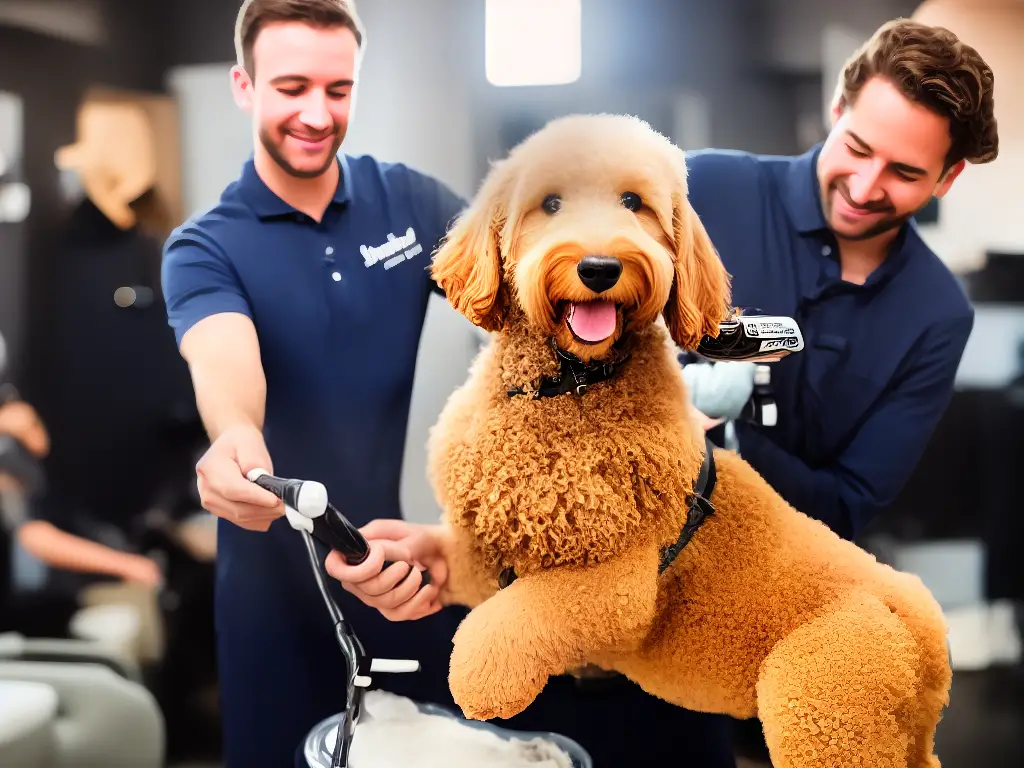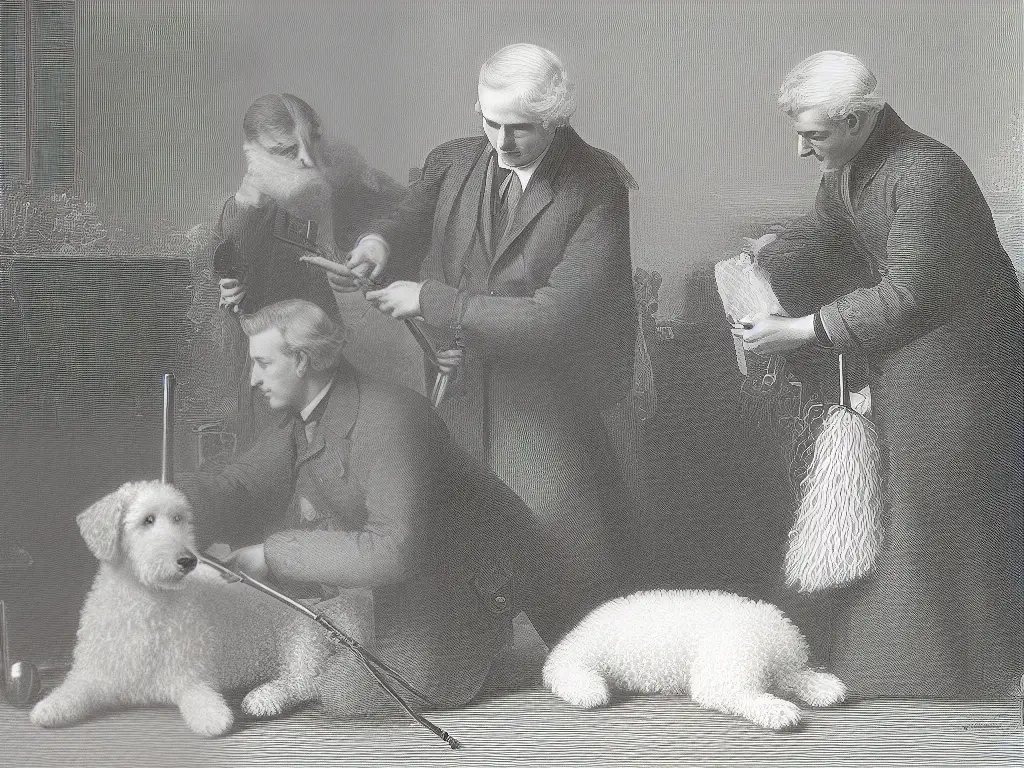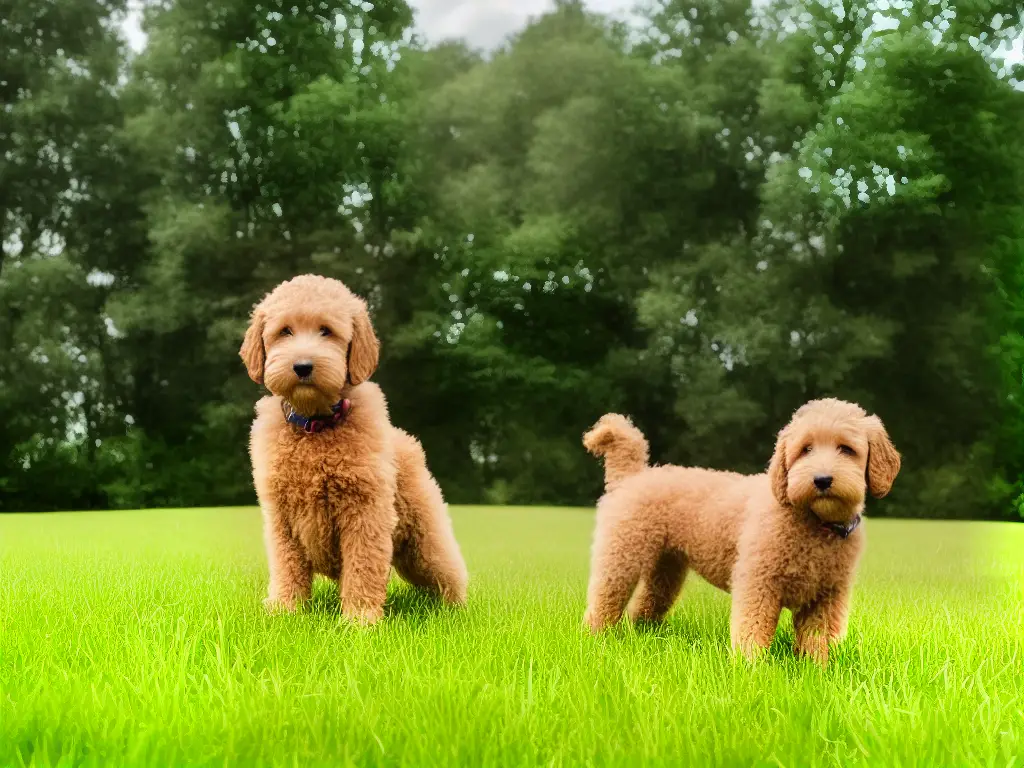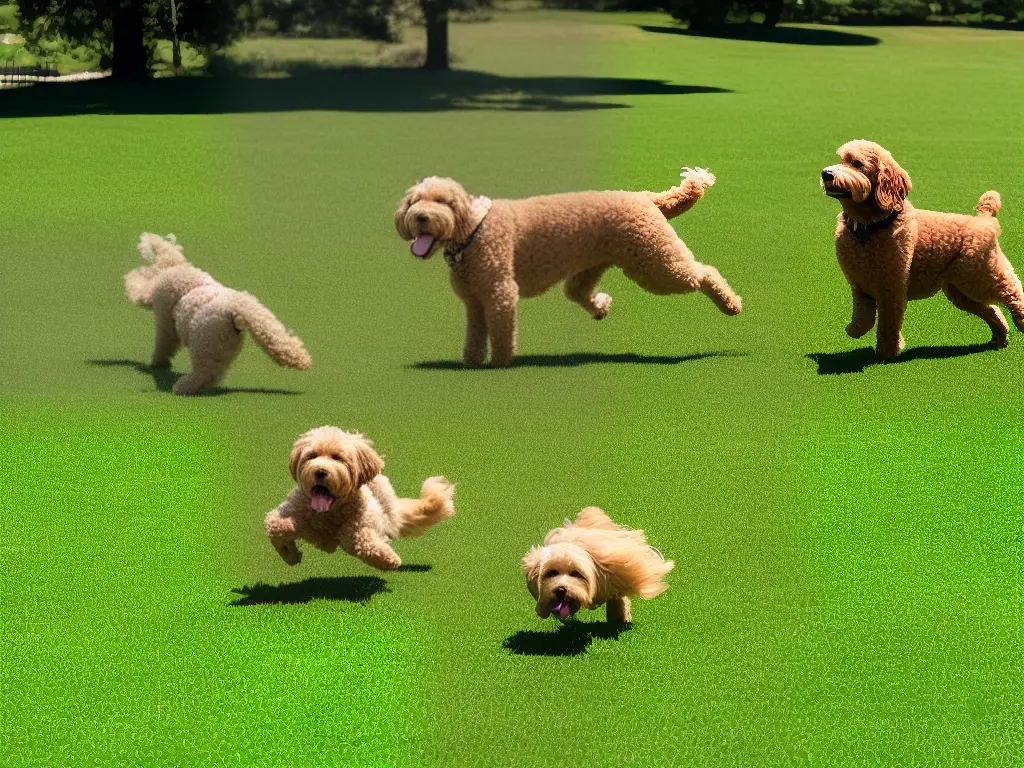Goldendoodles, a popular hybrid breed, have captured the hearts of many dog lovers with their friendly disposition, adorable looks, and low-shedding coats. As a mix between a Golden Retriever and a Poodle, these charming canines offer the best of both worlds, making them excellent family pets. In this comprehensive guide, you’ll discover essential information about Goldendoodle puppies, including their origin, appearance, temperament, and care requirements. From selecting a reputable breeder or adopting a rescue pup to providing proper nutrition, grooming, and training, this article will equip you with the knowledge you need to raise a happy and healthy Goldendoodle.
The Goldendoodle Breed
The Goldendoodle breed first emerged in the early 1990s, as a hybrid breed between the Golden Retriever and the Poodle. This intentional crossing aimed to combine the best qualities of both breeds, resulting in a dog that is intelligent, allergy-friendly, and with a low-shedding coat. The breed’s creation was an effort to offer a suitable option to those who loved the gentle and friendly nature of Golden Retrievers but wanted a dog that is easier on individuals with allergies. The Goldendoodle quickly gained popularity not just as family pets but also for their potential roles as service and therapy dogs.
Three generations of Goldendoodles exist, based on the degree of breeding between Golden Retrievers and Poodles. The first-generation (F1) Goldendoodles are a direct cross between a purebred Golden Retriever and a purebred Poodle. This results in a 50/50 mix of both breeds in terms of traits in their offspring. The second-generation (F1B) Goldendoodles are a cross between an F1 Goldendoodle and a purebred Poodle, giving a higher percentage of Poodle characteristics, particularly, a curlier and less shedding coat. The third-generation (F2) Goldendoodles are bred by crossing two F1 Goldendoodles. However, the F2 generation is less predictable in terms of coat type and shedding, as the breed traits tend to be more randomized.
Goldendoodles come in different sizes due to the influence of the Poodle parentage. Poodles are typically bred in three sizes – standard, miniature, and toy – which is reflected in the size variation found within Goldendoodles. The standard Goldendoodle is typically 50-90 pounds, while the miniature Goldendoodle typically ranges from 25-50 pounds, and the toy Goldendoodle stays under 25 pounds. This range of sizes allows potential owners to select a Goldendoodle that suits their living situation and lifestyle preferences, making this breed even more appealing.
The Goldendoodle breed is known for its friendly, affectionate, and social disposition. They are gentle and patient, making them excellent companions for children and other animals. Goldendoodles are highly intelligent and trainable, which can be attributed to the Poodle’s influence on their genetics. This genetic blend makes them well-suited for various roles such as therapy dogs, service dogs, and emotional support animals. Both parent breeds, the Golden Retriever and the Poodle, are famous for their versatility and ease of training, which is evident in their Goldendoodle offspring.
In summary, the Goldendoodle is an incredible breed that has emerged in recent decades as a result of the intentional crossing between Golden Retrievers and Poodles. This hybrid breed combines the desirable traits of both parent breeds, such as their hypoallergenic coat, high intelligence, and gentle temperament. Due to these characteristics, Goldendoodles are suitable as family pets, therapy dogs, and service animals.

About Goldendoodles
These popular and adorable pups have diversified over generations, offering a range of sizes and coat types for prospective owners to choose from. Goldendoodles inherit their friendly disposition from the Golden Retriever, while their Poodle heritage contributes to their low-shedding coat, making them an ideal choice for those with allergies. This unique blend of qualities allows individuals and families to find the perfect Goldendoodle to suit their unique needs and preferences.
Their size and appearance can vary a bit due to these genetic differences, but they generally fall into one of three size categories: miniature, small standard, and standard.
Miniature Goldendoodles
Miniature goldendoodles, also known as mini goldendoodles, are the smallest of the three sizes. They typically weigh between 15 to 30 pounds and stand at about 13 to 20 inches tall at the shoulder. This small size is achieved by crossing a golden retriever with a miniature or toy poodle. Their smaller stature makes them an attractive option for families with limited living space or for those who desire a smaller-sized dog.
Small and Standard Goldendoodles
Small standard and standard goldendoodles are slightly larger than their miniature counterparts. Small standard goldendoodles weigh between 30 to 45 pounds and measure around 17 to 20 inches tall at the shoulder. Standard goldendoodles, on the other hand, can weigh anywhere from 45 to 100 pounds and range in height from 20 to 26 inches. The sizes of these goldendoodles may be influenced by the size of the poodle in their genetic line.
One of the most notable features of goldendoodle puppies is their coat. Depending on the percentage of retriever or poodle genetics, their coats can range from wavy to curly. Wavy-coated goldendoodles have a loose, flowing coat that resembles that of a retriever, while curly-coated goldendoodles have a tighter, more poodle-like curl to their fur. Both coat types can come in various colors, including shades of cream, gold, red, apricot, chocolate, and even black. The tightness of the curls in their coat might be influenced by the type of poodle – regular or miniature – in their ancestry.
Goldendoodle puppies, a delightful mix of Golden Retriever and Poodle breeds, are known for their lovable and expressive faces with large, soulful eyes. These charming pups often inherit the playful and happy-go-lucky demeanor of the Golden Retriever, combined with the intelligence and low-shedding qualities of the Poodle. As a result, they make wonderful companions for families with young children, individuals with allergies, and those in need of assistance or therapy dogs.

Goldendoodle Puppies: Friendly, Playful, and Intelligent
Not only do goldendoodle puppies make great family pets due to their affectionate and friendly nature, but they also get along well with children and other pets, as long as they are socialized early on. These puppies love being around people and receiving ample affection from their owners, which helps create a strong bond between them and their human family members. Above all, goldendoodle puppies are known to bring immense joy and companionship to any home.
One of the key traits of Goldendoodle puppies is their intelligence inherited from both parent breeds. This makes them highly trainable and eager to learn new commands and tricks. They are quick learners, making it possible to start their training from an early age. To help your Goldendoodle thrive, use positive training methods and ensure they have access to a stimulating environment for mental enrichment.
Goldendoodle puppies thrive on physical exercise and playtime. As they grow, they will need daily exercise to keep them physically fit and mentally stimulated. Activities like playing fetch, walking, swimming, and even agility courses can be great ways to keep your Goldendoodle puppy entertained and well-exercised.
Like all puppies, Goldendoodles can develop undesirable behaviors if not adequately addressed early on. They can be prone to barking, digging, and even separation anxiety if left alone for extended periods without adequate physical and mental stimulation. To prevent unwanted behaviors, it’s crucial to provide your Goldendoodle puppy with enough exercise, mental stimulation, and positive reinforcement during training.
Early socialization is crucial to ensure that your Goldendoodle puppy develops a well-rounded personality. By introducing your puppy to different people, animals, and environments, they will become comfortable and confident in various situations. Combined with early training and positive reinforcement, your Goldendoodle will grow up to be an affectionate, intelligent, and well-balanced companion.

Feeding Your Goldendoodle Puppy
To further support your Goldendoodle’s growth and development, provide them with high-quality food that is rich in protein and essential nutrients. Feeding your puppy the right nutrients in the correct quantities is essential for their physical and cognitive development, creating a strong foundation for a healthy, happy future together.
A balanced diet should contain protein sources such as chicken, fish, or lamb, as well as complex carbohydrates, fruits, and vegetables that provide essential vitamins, minerals, and antioxidants. It is also important to choose food formulated specifically for puppies, as their nutritional needs differ from those of adult dogs.
When deciding on the type and brand of food, it is helpful to consult with your veterinarian or a pet nutrition expert. Goldendoodle puppies have different needs based on their size, age, and activity level. There are various commercial dog foods available in the market, but make sure to choose a reputable brand that uses high-quality, natural ingredients and is free from artificial additives, preservatives or colorings. Alternatively, you can opt for a homemade diet, but you must ensure that it meets all of your puppy’s nutritional requirements.
Establishing a consistent feeding schedule is crucial for your Goldendoodle puppy. Feeding your puppy at the same time every day will help in creating a routine for them and establish mealtime expectations. Generally, puppies between the ages of 8 to 12 weeks should be fed three to four times per day, while puppies aged 12 weeks to 6 months can be fed three times per day. Once your Goldendoodle reaches 6 months, they can be transitioned to eating two meals per day, which is a typical schedule for adult dogs.
Portion sizes should also be carefully considered when feeding your Goldendoodle puppy. Overfeeding can lead to obesity and joint issues, while underfeeding will hinder their growth and development. It is important to follow the feeding guidelines provided by your veterinarian or the recommendations on the dog food packaging, but be prepared to adjust accordingly as your puppy grows and their activity level changes. Monitoring your puppy’s weight and body condition is essential in ensuring they are receiving the right amount of food.
Ensuring a healthy and thriving Goldendoodle puppy goes beyond just providing proper nutrition and establishing consistent feeding habits. While it is essential to limit treats to no more than 10% of your puppy’s daily caloric intake and avoid feeding them human food, it is equally important to care for their beautiful and fluffy coats.

Grooming Your Goldendoodle Puppy
Regular grooming is crucial for maintaining the healthy appearance and preventing matting in Goldendoodle puppies. These adorable crossbreeds inherit their coat qualities from both their Golden Retriever and Poodle parents, which means that their coats can range from wavy to curly. Establishing a proper grooming routine early on in the puppy’s life will ensure good coat health, in addition to promoting their overall well-being.
Regular Brushing
-
Depending on the thickness and curliness of your puppy’s coat, you may need to brush them from a few times a week to every day. Regular brushing will help prevent matting, remove loose hair, and distribute natural oils throughout the fur for a healthier shine.
-
Use a slicker brush or a pin brush, as these are best suited for their coat type. You can also use a comb to gently work through any tangles in your puppy’s fur.
Bathing
-
Goldendoodles should be bathed once every one to two months using a high-quality canine shampoo formulated for their coat type. Be sure to rinse your puppy thoroughly after shampooing to avoid any skin irritations or residue build-up on their coat.
-
Gently towel dry your puppy and use a hairdryer on a low heat setting when brushing them to avoid creating tangles in their wet coat.
De-matting
-
To prevent mat formation, brush your puppy regularly and pay special attention to areas that are prone to matting, such as behind the ears, around the collar, and in the armpits.
-
If a mat does form, use a de-matting tool or comb to gently work through the tangle. In severe cases, consult a professional groomer.
Professional Grooming and Health Care for Goldendoodle Puppies
Goldendoodle puppies, a crossbreed between Golden Retrievers and Poodles, can be predisposed to certain health issues due to their mixed breed heritage. One of the ways to ensure their well-being and maintain their coat health is by taking them for regular trips to a professional groomer. This will not only ensure they are free of any parasites but also help in trimming their fur when necessary.

Health and Care Tips for Goldendoodle Puppies
It is crucial to introduce your Goldendoodle puppy to the grooming process early on, as it will help them feel comfortable and safe during their grooming sessions. Establishing a routine and a strong bond between the groomer and your puppy is essential to ensure a smooth and enjoyable experience for your pet.
Some common health problems that might affect Goldendoodles include hip dysplasia, progressive retinal atrophy (PRA), elbow dysplasia, and allergies.
Hip dysplasia is a genetic disorder in which the hip joint doesn’t develop properly, leading to arthritis and mobility issues as the dog ages.
PRA is an eye disorder that affects the retina, and it can lead to blindness if not detected early.
Elbow dysplasia is another joint issue related to bones not forming properly in the elbow, leading to pain and arthritis.
Lastly, Goldendoodles can suffer from allergies that cause skin irritations and infections.
To mitigate these health risks for your Goldendoodle puppy, ensuring a proper diet from an early age is essential.
Providing a diet rich in nutrients promotes healthy growth and supports the dog’s joint health.
Omega-3 fatty acids, for instance, can help reduce inflammation and improve joint lubrication.
Regular exercise is crucial as well to maintain a healthy weight and reduce the risk of obesity, which can exacerbate joint issues.
It is also important to avoid exercises that put too much strain on a young dog’s joints, like excessive jumping or running on hard surfaces.
Screening tests should be conducted on Goldendoodle puppies to identify possible health issues early on, enabling timely intervention.
Reputable breeders often perform health tests on both parent breeds before breeding to reduce the risk of passing down genetic disorders to the puppies.
When adopting a Goldendoodle puppy, be sure to inquire about the health history of the parent dogs and request documentation of any health tests performed.
Annual check-ups with a veterinarian should be scheduled to monitor the dog’s overall health and prevent potential issues from going unnoticed.
In addition to the genetic predispositions mentioned earlier, Goldendoodle puppies can also experience common dog health problems such as ear infections, dental issues, and gastrointestinal problems.
To prevent ear infections, it is essential to regularly clean and dry the floppy ears of your Goldendoodle.
Dental hygiene plays a significant role in the overall health of the dog, and maintaining a dental care routine that includes brushing and providing dental chews is recommended.
A well-balanced diet and regular vet check-ups can help address any gastrointestinal issues before they become severe.
Another essential aspect of caring for Goldendoodle puppies is ensuring proper grooming.
Since Goldendoodles can inherit either the Poodle’s curly coat or Golden Retriever’s wavy coat, brushing and grooming routines may vary slightly.
However, consistent grooming helps prevent matting and tangles while promoting a healthy coat and skin.
Along with regular grooming, it is critical to keep the dog’s living environment clean and free of allergens that can lead to irritation and infections.
Ensuring the overall health of your Goldendoodle puppy involves keeping up to date with vaccinations, flea and tick prevention, and heartworm prevention. As you take care of their physical health, it is also important to focus on their behavioral development.

Training and Socializing Your Goldendoodle Puppy
Training and socializing your Goldendoodle puppy is crucial for ensuring that they grow up to be well-mannered, confident, and happy dogs. As they are a mix of Golden Retrievers and Poodles, Goldendoodles are generally intelligent, friendly, and eager to please, making them relatively easy to train. One effective training method is positive reinforcement, which involves rewarding your puppy with treats, praise, or play when they perform the desired behavior. Consistency and patience are key to helping your puppy understand the commands and expectations you have for them, which will contribute to their overall well-being and happiness.
When it comes to housebreaking your Goldendoodle puppy, it is essential to establish and maintain a consistent routine. This means taking them out to the same designated potty spot at regular intervals throughout the day, such as when they wake up, after meals or playtime, and before bedtime. Rewarding your pup immediately after they eliminate outside will help reinforce the association between the behavior and the positive reinforcement. It is also important to supervise your puppy when inside to catch any potential accidents early and interrupt them by promptly taking your pup outside to the potty spot.
Obedience training is equally important for your Goldendoodle puppy. Start by teaching them basic commands such as “sit,” “stay,” “down,” “come,” and “leave it.” These commands not only help to establish a working relationship between you and your puppy, but they also ensure their safety and can prevent unwanted behaviors from developing. Training sessions should be short, fun, and positive, as this will help your Goldendoodle to stay engaged and focused on learning. As your puppy becomes more proficient at these commands, you can start working on more advanced obedience skills and possibly even enroll in group obedience classes.
Socialization is another essential aspect of raising a well-rounded and well-behaved Goldendoodle. Puppies have a critical socialization period between eight and sixteen weeks of age, during which they should be exposed to various people, places, other dogs, and experiences in a positive and controlled manner. This exposure helps them build confidence and adaptability, reducing the likelihood of anxiety or fear-based behaviors later in life. Introducing your puppy to a wide range of experiences, such as car rides, dog parks, and visits to pet stores or veterinary clinics, can further facilitate positive socialization.
Goldendoodle puppies are a crossbreed between a Golden Retriever and a Poodle, known for their intelligence, friendly temperament, and agility. Ensuring that they receive adequate exercise and playtime is vital to their physical and mental well-being. Generally, Goldendoodle puppies require at least 30 minutes to an hour of exercise and play daily, with larger and more active individuals needing up to two hours. As they grow and develop, their energy levels will increase and so should the duration of their activities.

Exercise and Playtime for Goldendoodle Puppies
In addition to exercise, proper handling and grooming should be introduced early on, as Goldendoodles have coats that require regular maintenance. Ensure your puppy is comfortable being touched and handled in different situations, such as touching their paws, examining their ears, and grooming their coat or brushing their teeth. Creating positive experiences with these everyday care routines will help your Goldendoodle stay relaxed and cooperative as they grow into adulthood.
Engaging in various physical activities and games is essential for your Goldendoodle puppy’s health and development. Walking and jogging are excellent forms of exercise, providing both mental stimulation and physical exertion. Fetch, a classic dog game, is a favorite among Goldendoodles, as it allows them to use their natural retrieving instincts. This game also provides an opportunity for you to bond with your puppy and reinforce important commands, such as “come” and “drop it.”
Mental stimulation is also an essential aspect of play for Goldendoodle puppies, as they are intelligent and eager to learn. Puzzle toys, hide-and-seek games, and teaching new tricks are all fantastic ways to challenge your puppy’s mind and help them develop problem-solving skills. Training sessions can be both enjoyable and rewarding, offering an opportunity for your Goldendoodle puppy to exercise their mind and strengthen their bond with you.
Socializing your Goldendoodle puppy through play with other dogs is another crucial aspect of exercise and mental stimulation. Regular playdates with other puppies or well-mannered adult dogs can help your Goldendoodle learn proper social skills, burn off excess energy, and maintain a healthy level of exercise. Visit dog parks or enroll your pup in a puppy socialization class, ensuring that they have positive experiences with a variety of dogs, people, and environments.
When planning playtime and exercise for your Goldendoodle puppy, it’s essential to consider their growth and development, as well as the impact it can have on their joints. Avoid rigorous activities or jumping from high surfaces, as this can result in injury. Instead, focus on low-impact exercise and games that promote overall health, mental stimulation, and socialization. By providing your Goldendoodle puppy with the right balance of exercise and play, you can ensure a happy, healthy, and well-rounded pup.

Choosing a Responsible & Reputable Goldendoodle Breeder
As you endeavor to give your Goldendoodle puppy a healthy and balanced lifestyle, it is just as important to find a responsible and reputable breeder. Carrying out thorough research is crucial when searching for a Goldendoodle puppy to bring into your home. By doing so, you can be confident in your choice and welcome a joyful and healthy companion into your family.
Start your search by asking for recommendations from friends, family, or your veterinarian. Additionally, you can check online forums, social media groups, and websites dedicated to Goldendoodles to gather information on reputable breeders in your area.
When you have identified potential breeders, it is important to visit their facilities in person. During your visit, pay attention to the cleanliness of the environment, the living conditions of the dogs, and how the breeder interacts with their dogs. A responsible breeder will have a clean and well-organized facility, and their dogs should appear healthy and well-socialized. Additionally, they should be knowledgeable about Goldendoodles, follow ethical breeding practices, and be transparent with their breeding methods and available puppies.
Before committing to a breeder, make sure to ask plenty of questions. Inquire about their experience in breeding Goldendoodles, their breeding philosophy, and the health testing they perform on their breeding dogs. It is crucial that the breeder tests their dogs for common genetic conditions associated with Goldendoodles, such as hip dysplasia, eye disorders, and heart issues. A responsible breeder will be happy to share this information, along with any certifications and veterinary records, to demonstrate the health of their puppies.
Be cautious of any red flags that may indicate an irresponsible or unethical breeder. These may include an unwillingness to show you the breeding facility, providing incomplete or vague health information, selling puppies at a very low price, or allowing puppies to be taken home before eight weeks of age. Also, be wary of breeders who do not ask you any questions about your lifestyle, experience with dogs, or suitability as a potential owner, as a responsible breeder will want to ensure their puppies are going to a suitable home.
Another essential aspect to consider when becoming informed on Goldendoodle puppies is the breeder’s commitment to the long-term well-being of their puppies. A reputable breeder will provide a written contract, outlining their health guarantee, return policy, and any requirements for puppy care. They should also offer lifelong support, be willing to answer any questions you may have, and be genuinely interested in the progress and well-being of your Goldendoodle. By selecting a responsible and reputable breeder, you can ensure that you bring home a healthy, well-adjusted Goldendoodle puppy who will become a loving member of your family.

Adopting a Goldendoodle Puppy from a Shelter or Rescue Organization
In addition to selecting a reputable breeder, adopting a Goldendoodle puppy from a rescue organization or shelter can also be a rewarding experience. There are several benefits to considering this option, one of which is the opportunity to provide a loving home to a dog in need. Many Goldendoodle puppies find themselves in shelters due to owner surrender, unfortunate circumstances, or being rescued from puppy mills. By choosing to adopt a puppy from a shelter or rescue, you can help reduce pet overpopulation and contribute to a more responsible and ethical pet industry while welcoming a loving new family member into your home.
Another advantage of adopting a Goldendoodle puppy from a rescue organization or shelter is that these puppies are often already vaccinated, spayed or neutered, and microchipped. This not only saves you time and money, but also ensures that you are getting a healthier and well-cared-for pet. Additionally, rescue organizations and shelters often provide guidance on and education about the proper care for your new pet. They work closely with potential adopters to ensure that the puppy is a good fit for its new family in terms of size, temperament, and energy levels.
On the other hand, there can be potential challenges when adopting a Goldendoodle puppy from a rescue organization or shelter. One such challenge is that the specific history and background of the dog may be unknown. With an incomplete or unclear history, it can be difficult to gauge potential behavioral issues or health problems. However, many rescue organizations and shelters take the time to evaluate each animal they take in and provide essential medical care, thus minimizing the risks involved in adopting a puppy from them.
Another potential challenge is limited availability. Goldendoodles have become a very popular breed, which can make finding one in a rescue or shelter more difficult than other breeds. However, with persistence and the use of online resources, it is possible to find the right puppy for you. In fact, there are rescue organizations that specialize in the Goldendoodle breed, and they can help match you with a suitable companion.
Although there can be challenges with adopting a Goldendoodle puppy from a rescue organization or shelter, the benefits often outweigh those concerns. The act of providing a loving home and second chance to a dog in need can be an incredibly fulfilling and rewarding experience. In addition, supporting rescue organizations and shelters helps to promote responsible pet ownership, and encourages a shift away from unethical breeding practices. This ultimately contributes to a healthier, more sustainable, and more compassionate pet industry.

With their playful nature and engaging personalities, Goldendoodles make incredible companions for people of all ages. By understanding the breed’s history, characteristics, and care requirements, you can ensure a comfortable and enriching environment for your Goldendoodle puppy. As you embark on this exciting journey, remember the importance of investing time and effort into proper training, socialization, and healthcare. Regardless of whether you choose to adopt a rescue or purchase a pup from a reputable breeder, your Goldendoodle will bring you endless joy and become an indispensable part of your family.